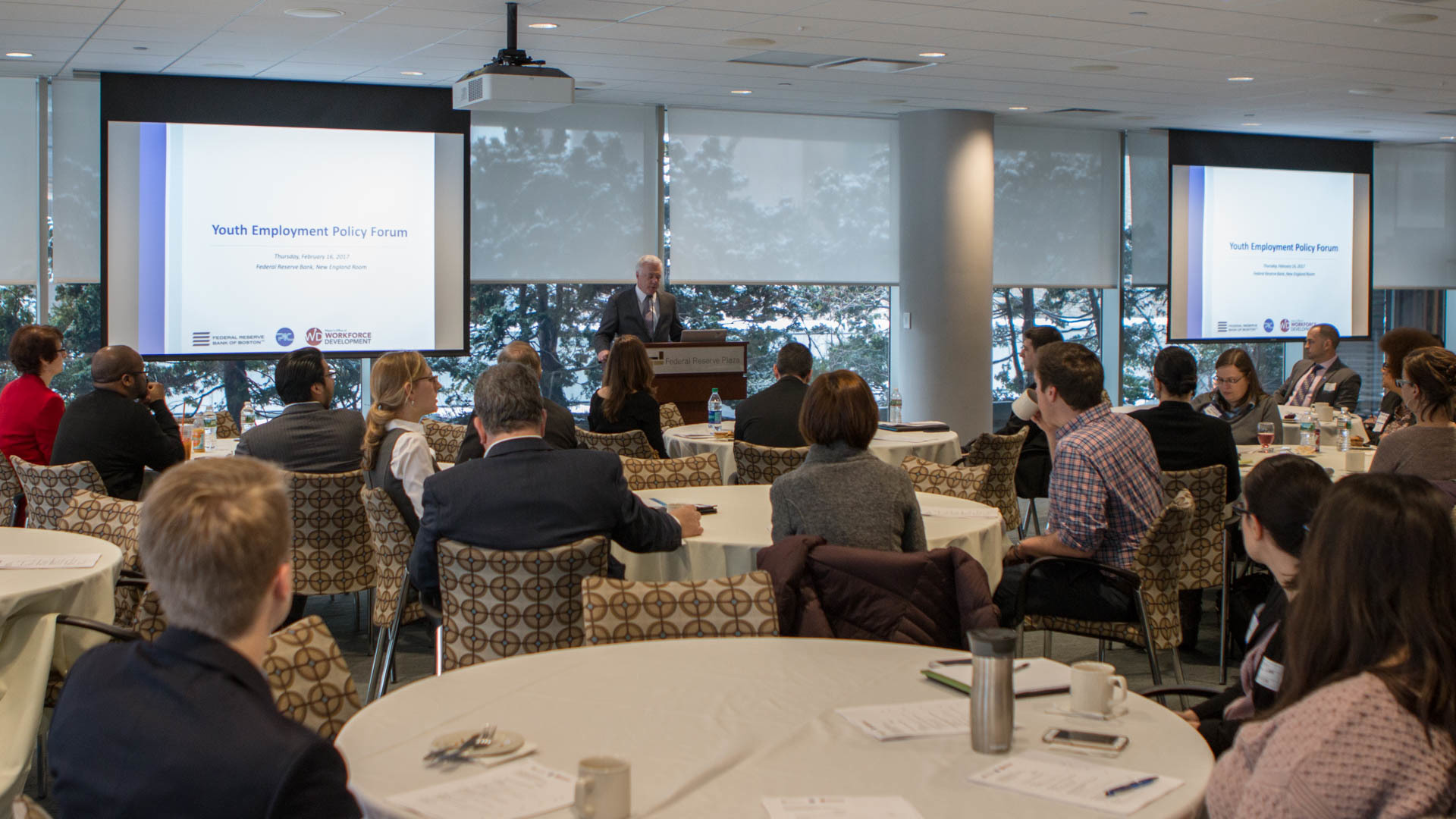Mass. Youth Employment Policy Forum sheds light on workforce challenges 
Featuring research presentations by Mark Melnik, Ph.D. and Alicia Sasser Modestino, Ph.D. 
Youth employment rates have not recovered with the rest of the economy and remain at historically low levels. What are the public policy implications? What are the benefits of early work experience?
These and other questions were explored during a Youth Employment Policy Forum, an event held jointly by the Boston Fed, the Boston Private Industry Council, and the City of Boston’s Office of Workforce Development on Feb. 16, 2017. The event featured research presentations by Mark Melnik, Ph.D. and Alicia Sasser Modestino, Ph.D., both of which shed light on the challenges faced by Massachusetts’ youth in today’s workforce.
6 images

Youth Labor Force Trends & Issues in Massachusetts, Mark Melnik, Ph.D. 
Director of Economic and Public Policy Research at the UMass Donahue Institute Mark Melnik discussed “Youth Labor Force Trends and Issues in Massachusetts.” His research tracks employment trends of young adults in the Bay State by region, with an emphasis on young adults who are neither enrolled in school nor employed.
Melnik noted a significant decrease in teen employment rates over the past 20 years, caused in part by factors such as:
- Technological advancements in industries that previously employed teens have either eliminated many of those jobs through automation or caused them to require higher technical skills;
- Older workers are staying in the workforce longer, impacting teens’ ability to access career pathways sooner;
- College matriculation rates have increased.
Key takeaways from Melnik’s presentation:
- Young men of color are those hardest hit by rising youth unemployment rates.
- Current programs designed for “one-off” integration of young adults into the workforce are not a scalable solution, thus pointing to systemic interventions, such as policy changes, as a more viable means for reversing this trend.
Impacts of Summer Employment Programs for Boston’s Youth, Alicia Sasser Modestino, Ph.D. 
Alicia Sasser Modestino, associate professor at Northeastern University and a visiting scholar at the Boston Fed, presented emerging research on the impact of summer employment programs for Boston youth. Modestino is assessing the effects of early work experiences provided by summer youth employment programs by linking self-reported, short-term outcomes to long-term outcomes of employment and wages, academic performance, and court involvement. This research aims to increase understanding of the mechanisms and program features that lead to the improved long-term outcomes increasingly sought by policymakers, and whether such programs have the potential to reduce inequality of opportunity across socioeconomic groups.
A key early finding of Modestino’s research:
- The largest skill and confidence gains were among nonwhite youth, suggesting that capacity exists for summer youth employment programs to impact inequality of opportunity.
Over 80 experts and thought leaders participated in discussions about “what it would take to return the teen (16- to 19-year-olds) employment rate to its 1999-2000 rate of 50 percent or higher.” These discussions generated ideas that spanned program design, a greater integration of job-readiness into grades K-12, exploring incentives and policies that could motivate more businesses to hire young adults, and the idea of creating a “scaffolded” approach to summer employment programs that channels young adults through a sequence of work experiences with increasing skill demands and broadening exposure to professional networks over time.
Read about the Boston Fed’s exploration of ways to increase employment opportunities here.

 About the Authors
About the Authors
Chris Shannon






